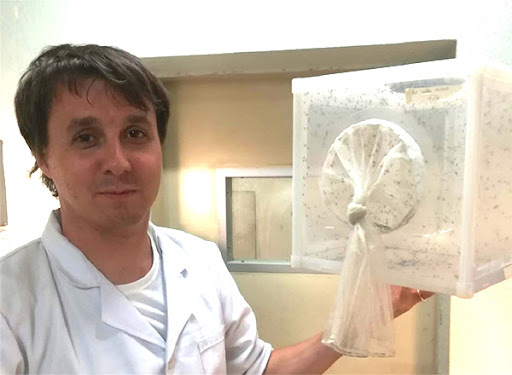Paolo Gabrieli

AH-INF MCA Project Title
“TOXMOS: TOXic males for MOSquito Control”, 2024
Who he is
In 2007, Paolo Gabrieli obtained his master degree in Applied Biological Sciences (summa cum laude) at the University of Pavia, Italy. From 2007-2011, he did his PhD in Cellular Biology at the University of Pavia, Italy, working on the sex determination in insects.
After completing his PhD, Dr. Gabrieli worked as post-doc in the lab of Prof. Flaminia Catteruccia (University of Perugia, Italy; Harvard School of Public Health, Boston, USA; Imperial College London, UK), where he worked on the mating system of Anopheles gambiae, the malaria mosquitoes. During this period, he discovered that the hormone 20-hydroxyecdysone, which is transferred from males to females during copulation, switch the female behaviour from a virgin to a mated status. Administration of this hormone or of its analogues to virgin mosquitoes make them sterile. This experience persuaded Dr. Gabrieli that the mating event is a key, sensible step in the mosquito lifecycle that can be manipulated to control mosquito populations.
In 2015, Dr. Gabrieli continued his research at the University of Pavia as post-doc. In this period his focus shifted to the study of the saliva of the tiger mosquito Aedes albopictus and he further specialize in protein expression and characterization in prof. Federico Forneris laboratory.
Four years later, Dr. Gabrieli moved to the University of Milan, Italy and in 2020 was promoted researcher, becoming Associate professor in Zoology in 2023. His research focuses on the study of the mosquito saliva and on the mosquito reproductive biology to develop strategies to control mosquito populations and the diseases that they transmit.
What he does
Prof. Gabrieli dedicates his research to the study of mosquito biology to develop new methods for the control of mosquito populations and the diseases that they transmit.
The major focus of the studies is the male mosquito. Males, indeed, are harmless to humans and animals: they do not bite, and they do not transmit diseases. Their major goal in their life is to find a female to mate with her and they are extremely efficient in doing so. Several techniques, including the sterile insect technique, exploit this male ability to modify the female physiology, for example sterilizing them.
Recent data from our laboratory and from studies in Drosophila melanogaster shows that one possibility is to reduce the lifespan of females by generating toxic males that kill females after mating. This has enormous advantages, because females transmit diseases and their fast elimination from the field is necessary.
The current project is, therefore, to generate efficient strains of toxic males able to kill females as fast as possible.


